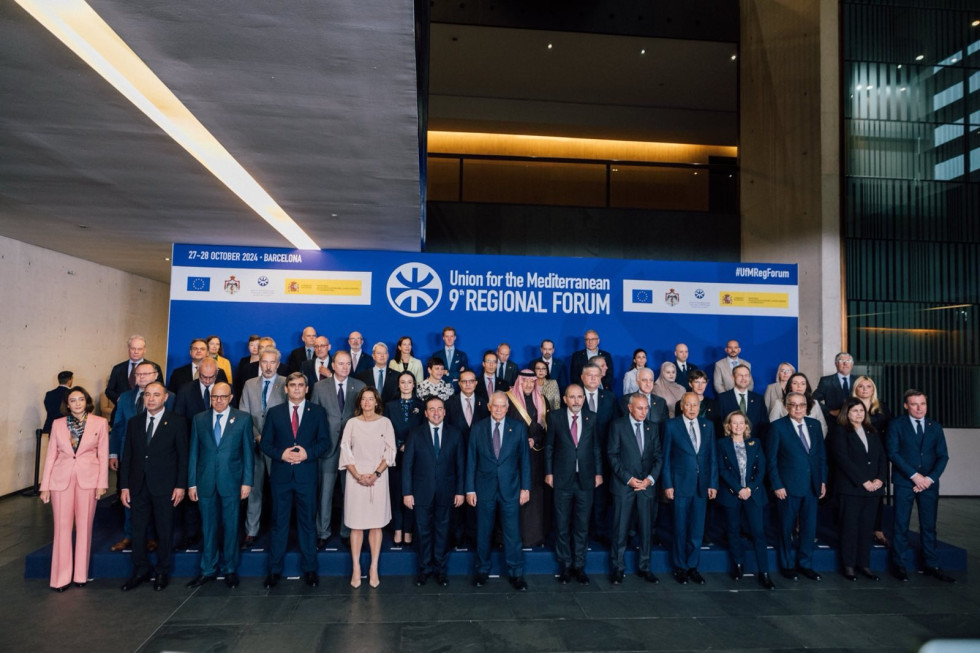Minister Fajon at UfM Regional Forum on resolving the crisis in the Middle East

Minister Tanja Fajon attending the UfM Regional Forum | Author Ministrstvo za zunanje in evropske zadeve
"By actively supporting the reform of this organisation, we are working to make the UfM a stronger regional actor that actively contributes to solving the pressing challenges in the region, in particular in achieving peace, security and stability," added Foreign Minister Fajon. In her address, she focused on the current crisis in the Middle East, which, she said, requires a united, strong and decisive response from the international community, including the EU. "As a member of the UN Security Council, Slovenia is aware of the importance of its southern neighbours in the Middle East and North Africa as key stakeholders and partners in achieving peace, security and stability in the EU's immediate neighbourhood," she said.
On the situation in Gaza, Minister Fajon reiterated her call for an immediate ceasefire, for urgent humanitarian aid and for a two-state solution: "We must stop the vicious cycle of violence and suffering in the Middle East, we insist on peace, and the recognition of a Palestinian state is the only solution for peace in the region." She offered to host the next meeting of the Global Alliance for a two-state solution and the establishment of a Palestinian state.
The priority, she said, is to achieve a permanent ceasefire between Lebanon and Israel to prevent further civilian suffering, to secure the border with Israel and to implement Security Council Resolution 1701, which is key to establishing stability along the Israeli-Lebanese border. "Lebanon's future depends on immediate, concerted international and local action. Now is the time to build a secure, sovereign and resilient state. Slovenia pledged 1 million euros in aid to Lebanon at the recent donor conference in Paris," she added.
Minister Fajon also presented Slovenia's initiative to establish the Euro-Mediterranean Students' Empowerment Fund, which would provide access to higher education and scholarships for disadvantaged students from unstable areas, especially Palestinian students.
In cooperation with the Anna Lindh Foundation, Slovenia is stepping up its engagement in the Euro-Mediterranean region, particularly in the areas of empowering women and youth, supporting civil society, strengthening the region's resilience, tackling the effects of climate change and promoting water and intercultural dialogue. Next year, Slovenia will chair the MED9 group - an alliance of nine Mediterranean and Southern EU Member States (Croatia, Cyprus, France, Greece, Italy, Malta, Portugal, Slovenia and Spain).
At the annual meeting of the UfM, foreign ministers exchanged views on common challenges and opportunities for cooperation, as well as on developments in the Euro-Mediterranean region, with a focus on reviewing achievements and taking stock of progress in the reform of the UfM. Ministers also discussed the worrying situation in Palestine and Lebanon and its impact on the region. They welcomed the joint celebration of the Mediterranean Day on 28 November, which will take place for the fourth time this year, and the announcement of the designation of "Mediterranean Capitals of Culture and Dialogue" in 2026.
The meeting was chaired by the Co-Presidents of the UfM, the High Representative of the Union for Foreign Affairs and Security Policy, Josep Borrell, and the Minister of Foreign Affairs of the Hashemite Kingdom of Jordan, Ayman Safadi, and hosted by the Minister for Foreign Affairs, European Union and Cooperation of Spain, José Manuel Albares.
In the margins of the meeting, Minister Fajon met with the Secretary General of the Union for the Mediterranean, Nasser Kamel. They discussed Slovenia's preparations for the MED9 Presidency, including water management in response to climate change and a preventive crisis mechanism. They agreed that the empowerment of young people, women and civil society can play an important role in creating a new perspective for the region.
Minister Fajon also met with Ayman Safadi, Deputy Prime Minister and Minister of Foreign Affairs and Expatriates of Jordan, Abdallah Rashid Bou Habib, Foreign Minister of Lebanon, and Benjamin Haddad, Deputy Foreign Minister of France. They discussed the current situation in the Middle East, the importance of providing additional humanitarian aid and a post-conflict plan for the region.

